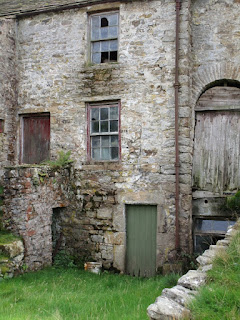On my way back from a visit to my Mum in Dorset I called in
at Burley in the New Forest, a place I haven’t visited in probably 35 years or
so. It’s an odd sort of place: most of the dwellings are at some distance from
the t-junction around which the centre of the village is organised, and as New
Forest-style ‘commoning’ is still practised locally you can often come across
ponies wandering around (though I didn’t). Two pubs, several tea shops, a
couple of spas, a cycle hire outfit and a grand mock-Tudor mansion now turned
into a hotel make for a collection of businesses largely orientated around
tourism, or other sorts of visitors. But what most strikes the tripper to
Burley (or this one, anyway) now is how witchy it is.
In what’s effectively two short streets there are four, or
maybe five, witch-themed gift shops: it depends how you categorise ‘Away With the
Fairies’, which has more of a fairy theme though it does overlap with the other
four – ‘Witchcraft’, ‘The Sorceror’s Apprentice’, ‘Cobwebs and Crystals’, and ‘A
Coven of Witches’. The last-named is the oldest store, beginning as an antiques
shop run by the person responsible for all this, Sybil Leek. Ms Leek lived in
Burley from some unspecified time until 1964, a familiar and flamboyant
character often accompanied by her pet jackdaw, Hotfoot Jackson. In his history
of wicca The Triumph of the Moon the great Ronald Hutton gives short
shrift to her claims to have been trained by Aleister Crowley, or even to have
met him, and even less to her historical sense, quoting a sentence ‘which
manages in twelve words to confuse a nineteenth-century personality with a
seventeenth-century one, and locate both in the wrong period’. Sybil Leek
worked for a local TV station and for a brief period was able to promote
herself as Britain’s chief spokesperson for witchcraft, before falling out with
almost everyone else in the wiccan world, claiming she was under attack from Satanists,
being evicted from her house in Burley, and relocating to the USA.
The stores share a family resemblance – they all have the
same racks of crystals and incense and other knickknacks – but differ subtly
from one another. At Cobwebs & Crystals, amongst the bottles of charged crystals
and figurines I observed a vintage plastic telephone for sale not far from a
small articulated toy of Matt Smith as the 12th Doctor, while Coven
is clearly catering for the serious wiccan practitioner as it sells altar
tables, cauldrons and wands (the kit’s small as I suppose it has to fit in teenagers’
bedrooms a lot of the time). All those items are seriously kitschy but there’s
a certain seductiveness about the whole aesthetic, which overlaps with Goth although not
identical with it.
In my long-distant memory Burley majored more on saddlery
and leather goods, and although the witchcraft connection is clearly longstanding,
it’s intensified in relatively recent years. Those horsey shops have been
replaced by witchy ones, and it would be an interesting project to trace exactly
how it has happened.
On the way out of Burley I stopped and walked down a muddy track to pay my respects to the Lady Well, which I certainly hadn’t seen since 1987. It hadn’t changed at all, which was a bit disappointing as I thought someone had tidied it up!
























